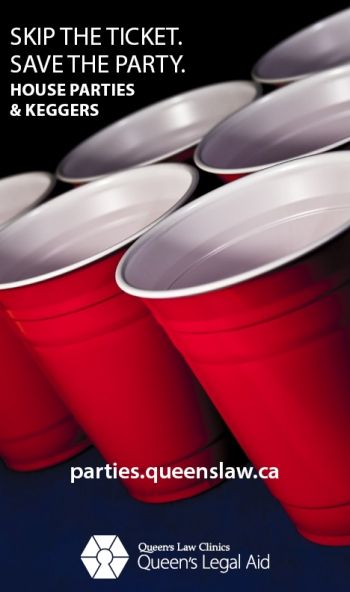
The jury is still out as on the merits and legalities of the City of Kingston’s new “Nuisance Party Bylaw,” but one thing already is clear: the measure may well heighten student demand for the services offered by Queen’s Legal Aid (QLA).
“As yet, most students don’t seem to know much about the bylaw or its implications,” says Frank Piazza, Law’19, QLA’s outreach coordinator.
Ignorance of the law is no defence, and so the clinics have launched an informational campaign on the responsibilities and pitfalls of hosting huge parties and of attending such gatherings when they get out of hand. “There’s a student interest in knowing the boundaries of the law so they can take steps to choose wisely and stay out of trouble that can impact on their health, reputation, pocketbook, and community resources,” says QLA Review Counsel Jana Mills, Law’92.
In a bid to help students avoid legal troubles or to deal with the repercussions of being ticketed, QLA is distributing posters and pamphlets on campus and posting information online.
The City of Kingston created the Nuisance Party Bylaw – “the kegger bylaw,” as it has been dubbed – with the tacit cooperation of the university, and launched its own “University District Safety Initiative” pilot program in the student-filled neighbourhoods surrounding campus.
According to a statement found on the City’s website, the new bylaw will provide police and bylaw enforcement officers with authority to address “the negative impacts on neighbourhoods of behaviours associated with large social gatherings” – in particular, unauthorized street parties that erupt each year on St. Patrick’s Day, during Orientation activities, and on Homecoming weekend.
“By exercising the authority provided under a nuisance party bylaw, an Order can be issued by Police for large social gatherings to cease, and for the dispersal of people not residing at a residence where the social gathering is occurring.”
To ensure personal accountability, those who are charged with violating the Nuisance Party Bylaw will receive a summons to personally appear before a Justice of the Peace in Kingston, regardless of where they live. There is no option to settle the charge by mail, online, or by phone. Fines for those who are found to have breached the bylaw can be substantial – as much as $10,000 for a first offence and $25,000 for any subsequent offence.
Speaking on behalf of QLA, Mills says she is concerned that sections of the new bylaw are vague and she is curious to see the impact that having all who are ticketed personally appear before a Justice of the Peace when court dockets are already crowded and resources are stretched thin. “Additionally, students are the main target of this bylaw. We have some concerns about the specific targeting of a population,” she notes.
The Queen’s Legal Clinics, including Legal Aid, gratefully acknowledge the support of Legal Aid Ontario, the Law Foundation of Ontario, Pro Bono Students Canada, the class of Law’81, and our many alumni and industry sponsors.
By Ken Cuthbertson